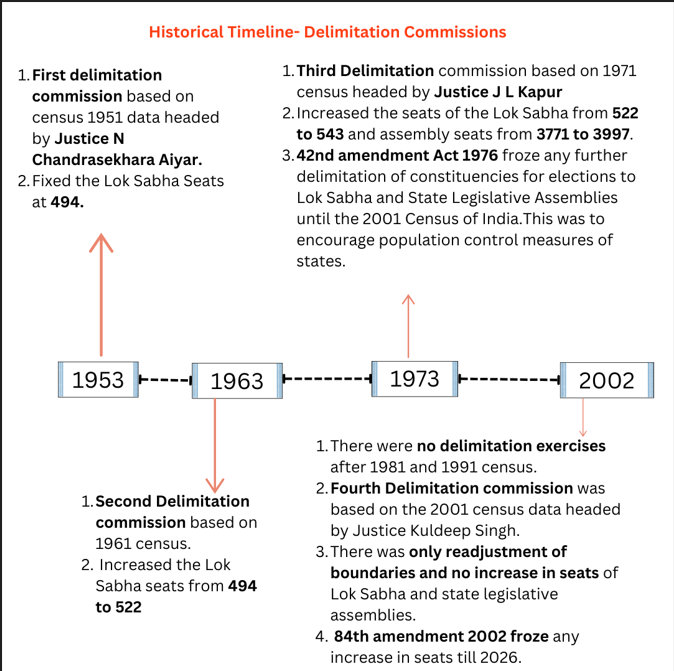ForumIAS announcing GS Foundation Program for UPSC CSE 2025-26 from 19 April. Click Here for more information.
Contents
| For 7PM Editorial Archives click HERE → |
Recently, Delimitation exercise which is carried out by the delimitation commission has been in news during the parliamentary debates over the passage of the Women reservation bill/Nari Shakti Vandana Adhiniyam. According to the bill, women reservation will come into effect only after delimitation is carried out based on the figures of the first census conducted after the passage of the bill.
Who conducts the Delimitation Exercise?
Delimitation is the act or process of fixing limits or boundaries of territorial constituencies in a country to reflect the changes in population.In India the task of delimitation exercise is assigned to a high power body. Such a body is known as Delimitation Commission or a Boundary Commission.
Constitutional basis of Delimitation Commission
| Article 82 | Article 82 mandates the Parliament to enact a Delimitation Act and constitute Delimitation commission after every Census. |
| Article 170 | Article 170 provides for the division of territorial constituencies of states by the Delimitation Commission after every Census. |
Absolute powers to the Commission- Delimitation Act mandates that the Delimitation Commission’s orders are final and cannot be questioned before any court as it would hold up an election indefinitely. When the orders of the Delimitation Commission are laid before the Lok Sabha or State Legislative Assembly, they cannot effect any modification in the orders.The Delimitation Commission is to work without any executive influence.
Composition of Delimitation Commission
| Appointment | The Delimitation Commission is appointed by the President of India and works in collaboration with the Election Commission of India. |
| Members | Retired Supreme Court judge (Chairperson) Chief Election Commissioner Respective State Election Commissioners |
Historical Timeline of Delimitation Exercises
The Union government creates the Commission once the Delimitation Act is in effect. Under the Delimitation Acts of 1952, 1962, 1972, and 2002, Delimitation Commissions were established four times- in 1952, 1963, 1973 and 2002. The commission was not created after the 1981 and 1991 Censuses.

What is the Significance of Delimitation Exercise?
Ensuring Proportional Representation- Delimitation Exercise provides equal representation to equal segments of population. The Delimitation Commission chooses the number and boundaries of the constituencies in such a way that the population of each seat is the same, as far as possible.
Reservation of seats for SCs and STs- Delimitation exercise conducted by the delimitation commission specifies seats in areas with sizable scheduled castes and scheduled tribes population which are to be reserved for those communities.
Impartial Exercise- The Delimitation Commission is a panel with legislative backing but it operates independently of the government and political parties. Rulings of the commission cannot be challenged in the parliament or any courts. This ensures its impartial functioning in the delimitation exercise.
One Vote one Value- The delimitation exercise by the Commission ensures that the sacred principle of “One Vote One Value” is followed.
What are the criticisms of the Delimitation Exercise in India?
No change in the number of seats despite increasing population- 42nd Constitutional Amendment Act 1976 freezed the number of seats of the Lok Sabha and the state legislative assemblies based on the census 1971 figures. Further the 84th Constitutional Amendment Act also froze the number of seats based on 1971 census till 2026. Thus the delimitation exercises by the delimitation commission are only cosmetic changes with the alteration of boundaries only.
Skipping of the delimitation exercise- Even though the constitution mandates the conduction of delimitation exercise after each census, governements have skipped the creation of delimitation commissions after the 1981, 1991 and 2011 census. Growing population is not reflected by these delimitation exercises.
Read More- Delimitation in J&K
What are the Challenges with Conducting Delimitation Exercise in India?
Disadvantageous for States that have controlled their population- Delimitation exercise is disadvantageous to states that have controlled their population(Southern States). Delimitation will benefit states that have not controlled their population as they will end up with higher number of seats in the Lok Sabha (Like Bihar and UP).
Disavantageous for regional parties- Southern regional parties like DMK, TDP, YSRCP that have presence in their states only will be in a disadvantageous position. Their share of seats and bargaining power will decrease in the Lok Sabha.
Can fuel separatist movement- The delimitation exercise based on the recent census data can fuel separatist regional movements like Dravida Nadu and it will hamper the federal political structure of the Country.
Delay in Delimitation can delay the implementation of Women’s reservation- The Women reservation bill/Nari Shakti Vandana Adhiniyam has been linked with the delimitation process. Since delimitation is itself a contentious issue this can delay the implementation of women Quota.
What Should be the Way Forward for the delimitation exercise?
Development of National Consensus- Any step towards delimitation exercise must be based on National Consensus and the fears of the regional Political parties must be addressed.
Incentivising the population controlling states through Finance Commission- The Finance commission must evolve formula to reward the states which have controlled their Population financially.
Read More- Election Commission of India




